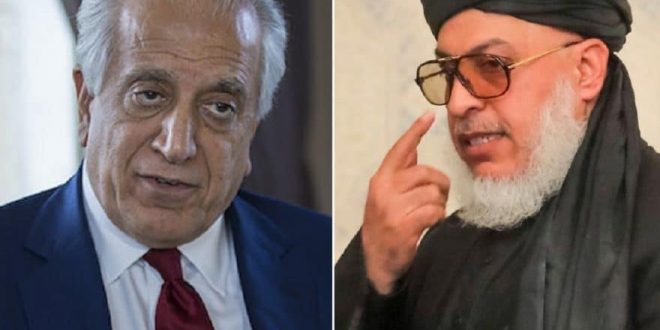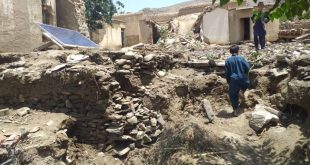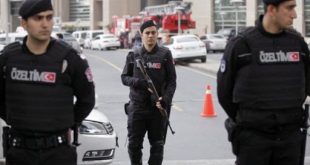Quite famous for his unpredictable and startling style of policy making on critical issues, the twitter obsessed President Trump called off the peace talks with Taliban after claiming that he was due to host Taliban and the Afghan president at camp David, the presidential retreat in Maryland, on Sunday, the 8th September 2019. He arrived at the decision after the Taliban claimed the responsibility for a car bomb attack in the city of Kabul, earlier this week, which left 12 dead, including one US soldier. This has come after a deadly bomb attack in the province of Baghlan and Kunduz last week. The analysts were guessing some uneasy development in the US camp after the sudden cancellation of the planned US visit of President Ashraf Ghani on Friday, the September 06,2019. However, little did anyone realize that the announcement could be of such severity and magnitude?
The tweet puts an abrupt and screeching halt to the Afghan peace process, the US was so heavily invested in. The tumultuous peace process led by its chief architect Zalmay Kahlilzad, an Afghan origin US career diplomat hangs in balance. A rough draft of the peace deal was hammered out after nine rounds of talks in Doha with the same Taliban, the US had set out to eliminate post 9/11. While keeping the finer print of the draft peace deal under the wraps, US Special Representative for Afghanistan Reconciliation Zalmay Khalilzad announced in the popular TOLO TV that the US has “in principle” agreed to withdraw over 5,000 troops from Afghanistan in exchange for guarantees by the Taliban to not allow the war-torn country to be used as a launchpad for trans national terror attacks and further fight the growing menace of ISIS within Afghanistan. Breaking their personal pledges to Al Qaeda and further not allowing them to grow inside Afghanistan was another precondition set for Taliban. President Trump was also warming up to the peace draft. “We’re going down to 8,600 [troops] and then we’ll make a determination from there as to what happens,” Trump told Fox news.
But president Trump’s tweets has put cloud over the fate of the peace deal which was already confronted with plethora of obstacles, the primary being the lack of sufficient political buy in from the Taliban.
The success of the peace deal was contingent on subsequent “intra Afghan dialogue” especially with the elected Government of Afghanistan. The Taliban had overtly rejected any direct engagement with the elected Afghan Government and termed it as a “puppet regime of US”. The Ghani government was completely sidelined amid nine rounds of peace talks at Doha. The Afghan government was protesting vociferously, at their perpetual neglect and sidelining. In his official communiqué, President Ghani clearly underlined that any negotiations without its involvement were not going to work. He further asserted that his government would see the final draft of a US-Taliban agreement for a “comprehensive discussion” before it was inked. Beside these, he was on his way to conclude the presidential election scheduled for Sept 28, allaying all concerns of Taliban to withhold the election in the interest of the crucial peace process entering its penultimate phase.
The ongoing peace negotiation was further cryptic about the political arrangement in a post US exit scenario. The power sharing idea floated by the chief negotiator was set aside by the Taliban as something to be discussed only after the complete withdrawal of US forces from Afghanistan. One thing was amply clear that the Taliban is not fighting the relentless war to assume power through ballot boxes which they have shunned long back. Taliban is further not known to be amenable to being a part of the ruling dispensation in Kabul given its long cherished ambitions and penchant for ruling the country. Those who know Taliban leadership from inside are highly suspicious that Taliban would be willing to share power within a political arrangement that they have long banished. The Taliban has abrogated the constitution of Afghanistan and it won’t be prudent to think that they would abide by the same constitution in a post peace process scenario. President Ghani and his government have clearly stated their unflinching commitment for the Afghan constitution and not the emirates that Taliban openly advocates. Will these two streams of conflicting political ideology and diametrically opposite views coexist in a ruling conclave in the largely anticipated political set up, post US exit from Afghanistan, remains as another acid test?
There are serious questions about the commitment of Taliban around the peace process with their continual rejection of ceasefire. On the contrary they were stepping up their attacks across the country in order to leverage more bargaining power on the peace table. The attacks has culminated Taliban to their strongest position ever, controlling and swaying over roughly half of Afghanistan since their collapse in 2001. They have the military momentum going with them and will not accept any ceasefire, despite repeated calls from the US and their Afghan counterpart to shun violence amid the peace process.
There are various factions within Taliban and some of them have started to believe that they can achieve their end-goals soon and thus will not shun violence under any circumstances. The ongoing peace process was cardinal strategy for the pentagon, but for the Taliban it was mere one of the options at their disposal. The failure of the peace process would not cost them anything additional.
While everyone advocates peace dialogue to be the only option, it is imperative for both parties to be equally invested in the same for a meaningful and durable solution. The onus of steering the peace process was completely left at the behest of the US. At this juncture the peace process is heavily titled towards Taliban, which is not an ideal scenario for striking a win-win deal for the US to end the longest and the most complex war in US military history.
An Afghan political settlement will further not be durable unless regional powers and Afghanistan’s immediate neighbours Pakistan and Iran support it. Prime minister Imran Khan would leave no stone unturned to make President trump understand the indispensability of Pakistan in solving the Afghan imbroglio. Trump has awarded the “good Samaritan” certificate to PM Imran Khan perhaps too soon, as he wanted to ride the influence of Pakistan over Taliban to conclude the peace deal. Pakistan on its part would not subscribe the reversal of the peace process. The fault line between US and Pakistan policy in Afghanistan is set to widen further, in case US ask Pakistan to talk tough with Taliban. In such a scenario Pakistan would resort to their strategic dividend yielding age old policy of “deceit and duplicity” in Afghanistan. The newfound bonhomie between two allies would dissipate soon. However Pakistan would play their cards carefully without conceding any ground to India, who is elbowed out of the peace process. India would see this as an opportunity to get into thick of things to make itself a potent player in the greatly contested “peace game’ in Afghanistan. It would be unfair to accept Iran, which enjoys a limited role to be of any help to US in stabilizing Afghanistan given the country reeling under harsh sanctions imposed by Trump.
US is left with very limited bandwidth in terms of strategic options in Afghanistan. Surging the military boots in Afghanistan is not an option anymore as it has been proven counterproductive. This would embolden Taliban further as has been proven in the last 18 years. This also means that President Trump had to renege on his electoral vow of a complete withdrawal of US military personnel from Afghanistan. Military surge would make a significant dent into his carefully nurtured “deal maker” image and reduce his electoral prospect to some extent, if not diminish completely, for his second bid to white house. He won’t be comfortable approaching the impending presidential election with such a scenario.
Taliban knew it well that it is a Saigon moment for the US forces. The writing is on the wall. The US is not winning this war anytime in the foreseeable future. The imminent peace deal was the only face-saver to exit from Afghanistan after fighting for 18 long years. The US was desperate to end an unwinnable war in the region where they over committed themselves than what they could actually deliver.
It is unclear if the US-Taliban talks have hit a permanent deadlock or a temporary pause at this juncture. The US has invested too deep to call off the peace process completely. Taliban would step up attacks further in advent of any fall out with the US. It would be interesting to watch, if the US can pull a rabbit out of the hat to resolve the impending mess and mayhem in Afghanistan.
Sujeet Sarkar works as an international advisor on governance and writes columns on international affairs for leading international dailies. He has authored an acclaimed book on Afghanistan titled In Search of a New Afghanistan. The views, perception and opinion expressed in this article are purely of the author
 Afghanistan Times
Afghanistan Times




